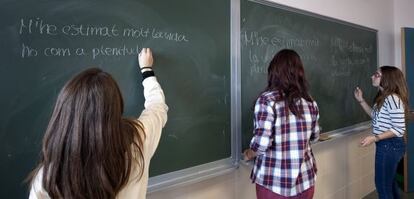Spanish students lagging behind in problem solving, PISA report shows
Low scores do not reflect 15-year-olds’ theoretical skills in math, reading and science

They have trouble programming an air conditioner, selecting the best route to get to a new location on public transport, and predicting the behavior of a robotic household cleaner inside a room.
Spanish 15-year-old students come out 23 points below average among developed economies in ordinary problem-solving skills, according to the latest Program for International Student Assessment (PISA) report, a triennial study conducted by the Organisation for Economic Co-operation and Development (OECD).
The performance by the 2,709 Spanish students who participated in the program – which evaluated 85,000 youngsters from 44 countries – shows that they are less well prepared to tackle the problems of everyday life than their scores in math, reading and science would suggest.
“What’s needed is a radical change in the teaching methodology,” says state secretary for education
Their problem-solving skills were 20 points below those expected based on their theoretical knowledge. In other words, they are unable to use what they learned.
“The world economy does not focus on what one knows, but on what one can do with what one knows,” noted the OECD’s education chief, Andreas Schleicher, who traveled to Spain to present the test results.
“What’s needed is a radical change in the teaching methodology,” added Montserrat Gomendio, state secretary for education, during the presentation of the report. Gomendio said current methods were “old-fashioned” and based only on memorizing content. Responsibility for this change, she said, falls mostly on the shoulders of teachers.
The PISA report shows that 28 percent of Spanish 15-year-olds failed to reach a minimum baseline level of proficiency in problem solving, compared with a 21-percent OECD average. Spain obtained a mean score of 477 points (500 is the OECD average), ranking between 27th and 31st out of 44. The list leaders are Singapore and South Korea with 562 and 561 points, respectively.
The children of very educated parents perform worse than expected, the study finds
Spain is dragged back by several factors. First there is the fact that the difference between problem solving by kids from low and high socioeconomic backgrounds is not nearly as marked as in other countries: 42.7 points compared with an average of 68.8. In other words, the children of highly educated parents perform worse than expected, bringing the average down. State secretary Gomendio said the “rigidity” of the education system establishes “an equity which is taken to mean that everyone must be uniformly mediocre.”
The high rate of students who repeat a grade (33.2 percent compared with the OECD average of 17 percent) also brings the scores down. Without them, Spanish students would obtain a score of 512 points, in line with the OECD average.
The PISA report notes that Spanish students seem unfamiliar with computer use, based on their digital reading scores. Yet 96.6 percent of Spanish teenagers have a computer at home, and 75.3 percent use computers or tablets in their houses, five points above the OECD average.
Tu suscripción se está usando en otro dispositivo
¿Quieres añadir otro usuario a tu suscripción?
Si continúas leyendo en este dispositivo, no se podrá leer en el otro.
FlechaTu suscripción se está usando en otro dispositivo y solo puedes acceder a EL PAÍS desde un dispositivo a la vez.
Si quieres compartir tu cuenta, cambia tu suscripción a la modalidad Premium, así podrás añadir otro usuario. Cada uno accederá con su propia cuenta de email, lo que os permitirá personalizar vuestra experiencia en EL PAÍS.
¿Tienes una suscripción de empresa? Accede aquí para contratar más cuentas.
En el caso de no saber quién está usando tu cuenta, te recomendamos cambiar tu contraseña aquí.
Si decides continuar compartiendo tu cuenta, este mensaje se mostrará en tu dispositivo y en el de la otra persona que está usando tu cuenta de forma indefinida, afectando a tu experiencia de lectura. Puedes consultar aquí los términos y condiciones de la suscripción digital.








































